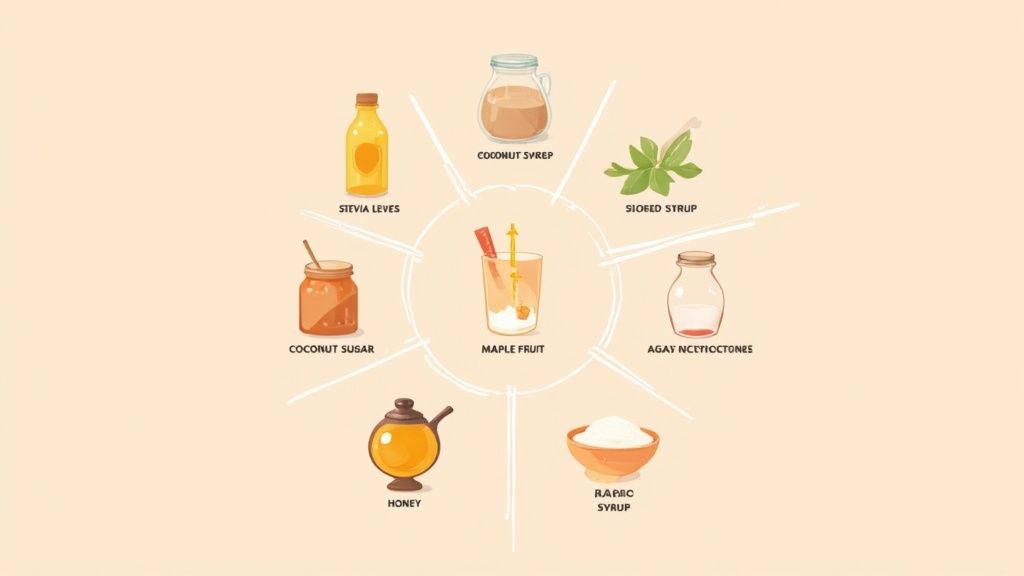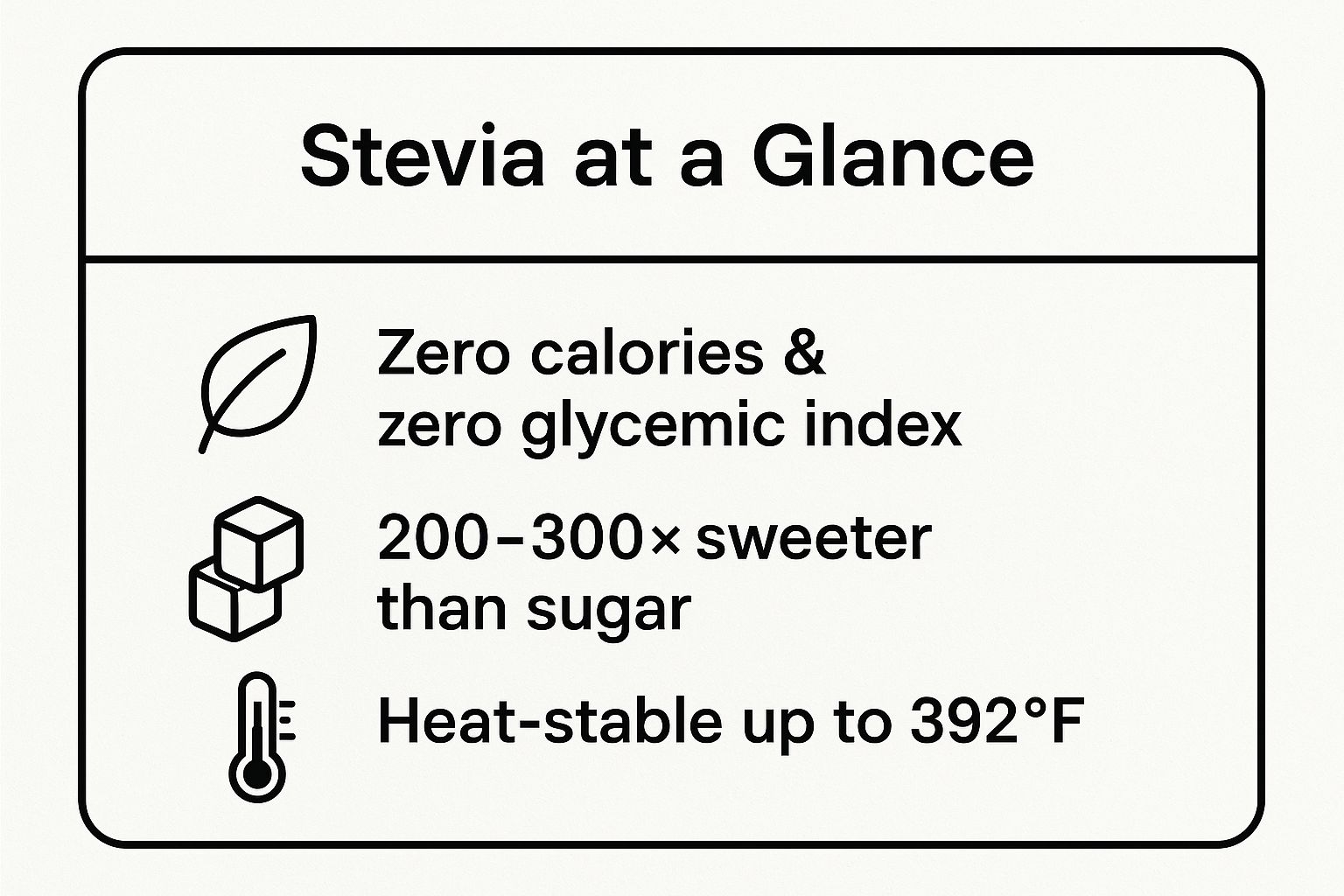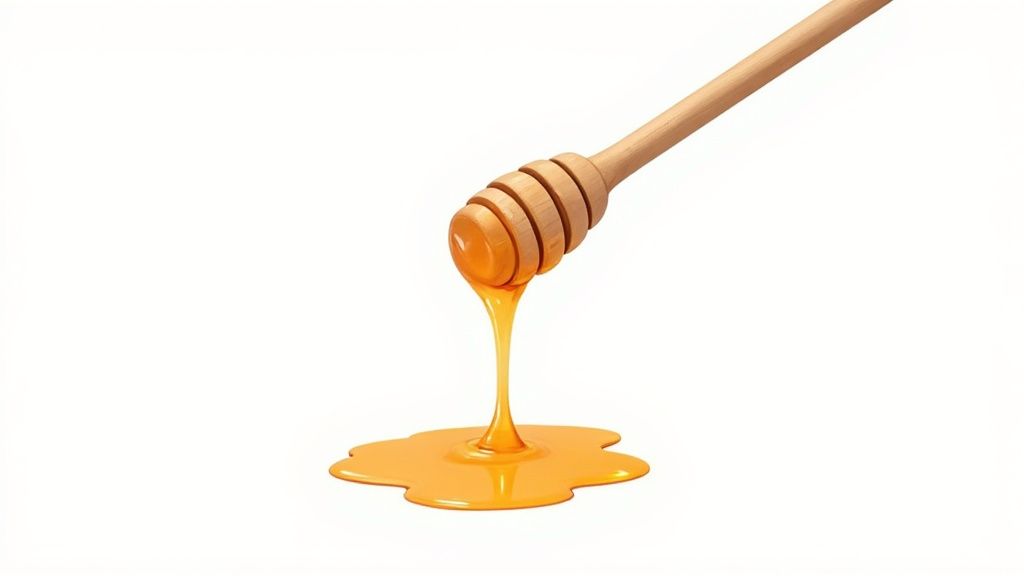8 Best Alternatives to Refined Sugar for a Healthier 2025

Cutting back on refined sugar is a common health goal, but the journey often feels confusing and restrictive. Many of us want to reduce our intake to avoid energy crashes, manage weight, and lower long-term health risks, yet the thought of sacrificing sweetness in our coffee, baked goods, and favorite recipes can be daunting. The good news is that you don't have to choose between your health goals and enjoying the flavors you love. A world of effective, delicious, and smarter sweeteners exists beyond the standard white crystals.
This comprehensive guide is designed to give you clear, practical information on the best alternatives to refined sugar. We will move beyond generic advice and provide actionable insights for each option. You will learn not just what they are, but exactly how to use them in your daily life, from baking a batch of cookies to sweetening your morning oatmeal. We will explore everything from zero-calorie plant-based options like stevia and monk fruit to nutrient-rich natural sweeteners like pure maple syrup and raw honey. Get ready to discover how to make informed, sustainable choices that satisfy your sweet tooth while supporting your well-being. Let's dive into the specifics.
1. Stevia
Stevia is a natural, zero-calorie sweetener that stands out as one of the most popular alternatives to refined sugar. Derived from the leaves of the Stevia rebaudiana plant, native to South America, this powerful sweetener has been used for centuries. The plant's sweet compounds, known as steviol glycosides, can be 200–300 times sweeter than table sugar, meaning you only need a tiny amount to achieve the desired sweetness.
This intensity makes it a go-to for many major brands. Products like Coca-Cola Life and Pepsi True have used stevia blends to lower their sugar content. You can also find it in Ben & Jerry's low-calorie ice cream flavors and as a common tabletop sweetener option in coffee shops, often under brand names like Truvia and PureVia.
How to Use Stevia Effectively
The key to using stevia is understanding its unique properties. Because it lacks sugar's bulk, you may need to adjust recipes, especially in baking.
- Start Small: Its concentrated sweetness can be overwhelming. Begin with a very small amount and adjust to taste.
- Combat the Aftertaste: Some people notice a slight licorice-like aftertaste. Combining stevia with another sweetener, like erythritol, can help create a more balanced, sugar-like flavor.
- Choose the Right Form: Liquid stevia drops are excellent for sweetening beverages like coffee, tea, and smoothies. Powdered stevia, especially blended with bulking agents, works better for baking.
- Add Bulk in Baking: When replacing sugar in a recipe, you lose volume. Compensate by adding ingredients like unsweetened applesauce, Greek yogurt, or pumpkin purée to maintain moisture and texture.
The infographic below offers a quick reference on stevia's primary benefits for those seeking a healthier sugar substitute.

As highlighted, stevia's zero-calorie, zero-glycemic-index profile makes it an excellent choice for managing blood sugar levels and calorie intake. If you're looking for more in-depth information on its benefits and uses, you can find a comprehensive comparison of the best sugar substitutes on stopsugar.app.
2. Monk Fruit Sweetener
Monk fruit sweetener, or luo han guo, is a natural, zero-calorie sweetener that offers another excellent alternative to refined sugar. Extracted from a small, round fruit native to southern China, its sweetness comes from antioxidant compounds called mogrosides. These compounds are around 150–200 times sweeter than table sugar, delivering a potent burst of sweetness without any calories or impact on blood sugar.

The sweetener has been popularized by the keto and paleo communities and is a staple in many health food products. You'll often find it as the star ingredient in brands like Lakanto, which blends it with erythritol for a better texture and taste. It's also used in premium protein powders, health supplements, and specialty baking mixes, prized for its clean flavor profile that lacks the bitter aftertaste some people associate with other sweeteners.
How to Use Monk Fruit Sweetener Effectively
Using monk fruit sweetener is straightforward, but a few tips can help you get the best results, especially when substituting it for sugar in recipes.
- Check the Label: Many monk fruit products are blends. Pure monk fruit is highly concentrated, while blends with erythritol or inulin offer a 1:1 replacement ratio for sugar, which is easier for baking.
- Start Small and Adjust: Due to its high sweetness intensity, it's wise to begin with less than you think you need. You can always add more to reach your desired taste.
- Store Properly: Keep it in a cool, dry place to prevent clumping and maintain its potency over time.
- Combine for Balance: Like stevia, monk fruit works well when combined with other natural sweeteners. This can help create a more rounded, sugar-like flavor profile in complex recipes.
- Use Conversion Charts: If you're using a pure or concentrated form, consult a brand-specific conversion chart to ensure you don't over-sweeten your food or drinks. Liquid forms are great for beverages, while granular blends are ideal for baking.
3. Erythritol
Erythritol is a sugar alcohol, or polyol, that has become a prominent player among alternatives to refined sugar. It occurs naturally in some fruits, like grapes and melons, and is commercially produced by fermenting glucose with yeast. It offers about 70% of the sweetness of table sugar but contains almost no calories, as the body excretes most of it unchanged.
Its clean, sugar-like taste and minimal impact on blood glucose have made it a favorite in the keto and low-carb communities. You will find erythritol as the primary ingredient in popular brands like Swerve and Wholesome Yum. It's also widely used in commercial sugar-free products, from chewing gum and candies to keto-friendly baked goods and ice cream, because it provides sweetness and bulk without the carbs.
How to Use Erythritol Effectively
Erythritol is an excellent bulking sweetener, making it one of the easiest sugar substitutes to use in baking. However, knowing a few tricks will ensure the best results.
- Adjust for Sweetness: Since it's slightly less sweet than sugar, you'll need more. A general rule is to use about 1⅓ cups of erythritol for every 1 cup of sugar a recipe calls for.
- Prevent a Cooling Sensation: Erythritol can sometimes leave a mild cooling aftertaste. Combining it with a small amount of a high-intensity sweetener like stevia or monk fruit can create a more balanced, authentic sugar flavor.
- Opt for Powdered Form: Granulated erythritol can sometimes recrystallize in cooled foods, creating a gritty texture. Use powdered or confectioners' erythritol for smooth applications like frostings, glazes, and no-bake desserts.
- Start Slowly: While it is one of the best-tolerated sugar alcohols, consuming large amounts (typically over 50 grams per day) can cause digestive discomfort for some individuals. Introduce it into your diet gradually.
Erythritol's near-zero effect on blood sugar makes it particularly beneficial for those managing their glucose levels. To understand more about its role in a diabetic-friendly diet, you can explore an in-depth guide to sugar alternatives for diabetics on stopsugar.app.
4. Xylitol
Xylitol is a naturally occurring sugar alcohol found in many fruits and vegetables, and even produced in small amounts by the human body. As one of the most effective alternatives to refined sugar, it provides the same level of sweetness as table sugar but with roughly 40% fewer calories. Most commercially available xylitol is extracted from birch bark or corn cobs, making it a plant-based option for those looking to cut down on sugar.
Its unique properties have made it a staple in dental health products. Brands like Epic Dental and Spry have built their product lines around xylitol's benefits, offering everything from chewing gum and mints to toothpaste and mouthwash. You will also find it used as a sweetener in many sugar-free medications, vitamins, and confectioneries like XyloBurst chewing gum.
How to Use Xylitol Effectively
The key to incorporating xylitol is to use it strategically for its dental benefits while being mindful of its digestive effects. It behaves much like sugar in recipes, making it an easy substitute.
- Introduce Gradually: Xylitol can cause digestive discomfort, like gas or bloating, if consumed in large amounts initially. Start with a small amount, such as 5-10 grams per day, and slowly increase your intake as your body adjusts.
- Keep Away From Pets: This is crucial. Xylitol is extremely toxic to dogs, causing a rapid release of insulin and a life-threatening drop in blood sugar. Ensure all products containing it are stored safely out of reach of any pets.
- Leverage for Dental Health: To maximize its dental benefits, chew xylitol-sweetened gum or use mints directly after meals. This practice helps neutralize plaque acids and reduces harmful bacteria that cause tooth decay.
- Use 1:1 in Recipes: Xylitol can be swapped for sugar in a 1:1 ratio in most recipes, including drinks and baked goods. However, note that it does not caramelize or brown like sugar, which may affect the final texture and appearance of certain desserts.
5. Raw Honey
Raw honey is a pure, unprocessed sweetener that serves as one of the most ancient and flavorful alternatives to refined sugar. Harvested directly from the beehive, it is not heated or filtered, a process that allows it to retain its natural enzymes, antioxidants, and trace minerals. This natural state gives it a nutritional edge over processed honey, which often loses these beneficial compounds during pasteurization. A single tablespoon contains approximately 64 calories, along with a rich, complex flavor that varies depending on the flowers the bees pollinated.

This natural sweetener is celebrated in both culinary and wellness circles. Premium varieties like Manuka honey from New Zealand are renowned for their potent medicinal properties, while local farmers market honey offers unique regional tastes like wildflower, clover, and orange blossom. Raw honey is a staple in traditional remedies for soothing sore throats and is also a gourmet ingredient in dressings, marinades, and baked goods, valued for its distinctive flavor profile.
How to Use Raw Honey Effectively
To make the most of raw honey, it's important to understand how to substitute it correctly and preserve its unique qualities. Its liquid form and intense sweetness require slight adjustments in recipes.
- Adjust Ratios Carefully: When replacing sugar, use about ¾ cup of honey for every 1 cup of sugar. Because honey is liquid, you should also reduce other liquids in the recipe by ¼ cup to maintain the right consistency.
- Look for Crystallization: Don't be alarmed if your raw honey crystallizes; this is a natural process and a sign of high-quality, authentic honey. Simply place the jar in a warm water bath to return it to its liquid state.
- Store at Room Temperature: Keep raw honey in a cool, dark place like a pantry. Refrigeration can accelerate crystallization and make it difficult to pour.
- Buy Local: Sourcing honey from local beekeepers is a great way to support small businesses. Some believe that consuming local honey may even help with seasonal allergies by exposing you to small amounts of local pollen.
While it contains sugar and calories, raw honey’s added enzymes and antioxidants make it a more functional choice than empty-calorie refined sugar. For a deeper dive into how it compares with other sweeteners, you can explore more healthy sugar alternatives on stopsugar.app.
6. Pure Maple Syrup
Pure maple syrup is a classic natural sweetener and a cherished alternative to refined sugar. Produced for centuries in North America, this thick, amber liquid is made by concentrating the sap of sugar maple trees. It’s an intensive process, as it takes approximately 40 gallons of raw sap to produce just one gallon of pure maple syrup. Unlike highly processed sweeteners, it retains beneficial minerals like manganese and zinc, along with antioxidants.
Its rich, complex flavor has made it a staple far beyond the breakfast table. Maple syrup is a key ingredient in glazes for roasted vegetables and meats, adds depth to baked goods like pies and cookies, and is a popular sweetener in marinades and dressings. Iconic producers from Vermont, New York, and Quebec, Canada, are famous for their high-quality syrup, which is graded by color and flavor intensity.
How to Use Pure Maple Syrup Effectively
To get the most out of this natural sweetener, it’s important to understand how to select and use it correctly, especially when substituting it for sugar in recipes.
- Choose 100% Pure: Always check the label for "100% pure maple syrup." Avoid "pancake syrup" or "breakfast syrup," which are typically just corn syrup with artificial flavors.
- Use the Right Ratio: When replacing granulated sugar, use about ¾ cup of maple syrup for every 1 cup of sugar called for in a recipe.
- Adjust Liquids: Because maple syrup is a liquid, you'll need to reduce other liquid ingredients in your recipe by about 3 tablespoons for every cup of syrup used to maintain the correct consistency.
- Select the Right Grade: Grade A Dark Robust syrup (what was once called Grade B) has a stronger flavor and a higher mineral content, making it ideal for baking. Lighter grades are better for drizzling on pancakes or yogurt.
- Store It Properly: Once opened, an unsealed container of pure maple syrup should be stored in the refrigerator to prevent mold from forming.
7. Coconut Sugar
Coconut sugar, often called coconut palm sugar, is a natural sweetener that offers a more rustic and minimally processed option among alternatives to refined sugar. It is made from the sap of the flower buds of the coconut palm tree. This sap is collected, then heated to evaporate its water content, leaving behind the familiar brown granules that look similar to raw sugar. Because it's less refined, it retains some trace nutrients from the coconut palm, including small amounts of iron, zinc, calcium, and potassium.
This sweetener has gained significant popularity within the paleo community and among health-conscious bakers. Brands like Big Tree Farms and Nutiva Organic Coconut Sugar are commonly found in health food stores. Its rich, caramel-like flavor also makes it a staple in many traditional Southeast Asian dishes, where it adds depth to both sweet and savory recipes.
How to Use Coconut Sugar Effectively
The key to using coconut sugar is leveraging its unique flavor and texture, which are similar to brown sugar. This makes it an easy and direct substitute in many recipes.
- Swap It 1:1: You can generally replace white or brown sugar with coconut sugar in a 1:1 ratio. This makes it incredibly user-friendly for baking and cooking without complex conversions.
- Ideal for Baking: Its brown sugar-like properties make it perfect for cookies, cakes, and muffins, where it contributes a pleasant moisture and a subtle caramel note. It also dissolves well in coffee and tea.
- Pair with Warm Spices: Coconut sugar's flavor profile combines beautifully with spices like cinnamon, nutmeg, and vanilla. Use it in oatmeal, crumbles, or spice cakes to enhance these warm notes.
- Store It Properly: Like brown sugar, coconut sugar can clump if exposed to moisture. Keep it in an airtight container in a cool, dry place to maintain its granular texture.
While coconut sugar is not a low-calorie food, its lower glycemic index and retained trace minerals make it a more wholesome choice than refined white sugar. For those looking for a natural sweetener that behaves predictably in recipes, it offers a fantastic and flavorful alternative.
8. Yacon Syrup
Yacon syrup is a unique natural sweetener extracted from the roots of the yacon plant, Smallanthus sonchifolius, native to the Andes mountains. It has a thick, dark consistency similar to molasses and serves as one of the more interesting alternatives to refined sugar due to its prebiotic properties. Its sweetness comes primarily from fructooligosaccharides (FOS), a type of soluble fiber that your body doesn't digest, which feeds beneficial gut bacteria instead.
This gut-friendly profile has made it a popular "superfood" sweetener. You'll find it from health-focused brands like Navitas Organics and Sunfood, often recommended for drizzling over oatmeal or blending into smoothies. Its rise in popularity was partly fueled by features on television shows like Dr. Oz, which highlighted its potential for weight management and gut health, bringing this traditional Andean food into the global health-conscious market.
How to Use Yacon Syrup Effectively
The key to using yacon syrup is understanding its composition and its effects on digestion. Since it's rich in fiber, introducing it slowly is crucial.
- Start Small: Begin with one teaspoon per day to see how your digestive system responds. Gradually increase your intake if desired, but avoid exceeding 20 grams (about one tablespoon) per day to prevent potential digestive discomfort like gas or bloating.
- Use It Raw: The beneficial FOS in yacon syrup can break down under high heat. Therefore, it's best used as a finishing sweetener for raw or low-temperature foods. Drizzle it over yogurt, pancakes, or use it in salad dressings and no-bake energy bites.
- Store It Properly: Once opened, yacon syrup should be refrigerated to maintain its freshness and quality. This helps preserve its delicate compounds.
- Don't Bake With It: Because heat degrades its structure, yacon syrup is not a good one-to-one replacement for sugar in baking. It won't provide the same browning or structural support and will lose its primary health benefits.
Top 8 Refined Sugar Alternatives Comparison
| Sweetener | Implementation Complexity 🔄 | Resource Requirements ⚡ | Expected Outcomes 📊 | Ideal Use Cases 💡 | Key Advantages ⭐ |
|---|---|---|---|---|---|
| Stevia | Low - easy to use; may need blending to mask aftertaste | Moderate - more expensive than sugar | Very sweet w/o calories; some bitterness possible | Beverages, low-calorie foods, diabetic-friendly | Zero calories, heat-stable, natural, no tooth decay |
| Monk Fruit Sweetener | Low - often blended for best results | High - costly, limited supply | No aftertaste for most; antioxidant benefits | Keto, diabetic diets, specialty health products | Zero calories, antioxidants, heat-stable |
| Erythritol | Medium - measure accurately; may combine to increase sweetness | Moderate - pricier than sugar | Sugar-like texture; slight cooling sensation | Baking, cooking, keto recipes | Closest sugar texture, zero glycemic index |
| Xylitol | Medium - 1:1 sugar substitute; caution needed | Moderate - derived from birch/corn | Tooth decay reduction; digestive issues risk | Dental care, baking, sugar replacement | Dental benefits, 40% fewer calories, natural taste |
| Raw Honey | Low - direct use; adjust recipes for moisture | Low to moderate - natural product | Antimicrobial, antioxidants; higher calories | Flavoring, natural remedies, cooking | Rich nutrients, antimicrobial, natural flavor |
| Pure Maple Syrup | Low - direct use; adjust liquids in recipes | Moderate - labor-intensive production | Antioxidants, minerals; higher calories | Pancakes, baking, glazes | Minerals & antioxidants, distinctive flavor |
| Coconut Sugar | Low - 1:1 sugar replacement | Moderate - sustainable, but limited | Similar to brown sugar; slightly lower glycemic index | Baking, beverages, paleo recipes | Natural, sustainable, trace minerals |
| Yacon Syrup | Medium - strong flavor limits use; best raw | High - limited availability, pricey | Prebiotic fiber benefits; may cause digestive upset | Smoothies, dressings, gut health supplements | Prebiotic rich, supports gut health |
Your Sweet Success: Choosing the Right Alternative for You
Embarking on a journey to reduce refined sugar is a powerful step toward better health, but it’s not about declaring all sweetness off-limits. As we've explored, the world of alternatives to refined sugar is diverse and full of fantastic options that can satisfy your cravings, stabilize your energy, and support your wellness goals without the negative impacts of processed white sugar.
The key to lasting success isn't just swapping one ingredient for another; it's about understanding the unique properties of each alternative and choosing the right one for the right moment. Your pantry might not need just one sugar substitute, but a small, curated collection to meet different needs.
Recapping Your Sweetener Toolkit
Let's quickly review the key takeaways from our exploration:
- For Zero-Calorie Sweetness: Stevia and monk fruit are your go-to options. They pack a powerful sweet punch without calories or carbs, making them ideal for beverages, sauces, and for those managing blood sugar levels. Remember, a little goes a very long way.
- For Baking & Texture: Sugar alcohols like erythritol and xylitol are structural powerhouses. They provide bulk and mouthfeel similar to sugar, making them excellent for baked goods. Just be mindful of potential digestive sensitivity and introduce them slowly.
- For Whole-Food Nutrition: Natural sugars like raw honey, pure maple syrup, coconut sugar, and yacon syrup offer more than just sweetness. They contain trace minerals, antioxidants, and, in the case of yacon syrup, beneficial prebiotic fibers. These are best for adding rich, complex flavors to dressings, marinades, and drizzling over foods.
Your Actionable Path Forward
Feeling empowered is great, but turning that feeling into action is what creates real change. Here’s how you can start integrating these alternatives into your life today:
- Start Small and Specific: Don't try to replace everything at once. Pick one daily habit, like your morning coffee or afternoon tea, and switch from sugar to a few drops of liquid stevia or a sprinkle of monk fruit. Master this one change first.
- Experiment in the Kitchen: The versatility of these natural sweeteners makes them ideal for various culinary applications. To further inspire your culinary journey with these alternatives, you might want to explore recipes for cooking and baking. Try using maple syrup in a salad dressing or swapping coconut sugar for brown sugar in your favorite cookie recipe. Pay attention to how the flavor and texture change.
- Listen to Your Body: This is the most crucial step. Notice how you feel after consuming different sweeteners. Do you feel more stable energy with erythritol? Does a touch of raw honey satisfy you more than white sugar did? Your body’s feedback is your best guide.
Ultimately, mastering the use of these sugar alternatives is about reclaiming control over your health and your palate. It’s a journey of discovery that leads to more stable energy, clearer thinking, and a sustainable, enjoyable way of eating. You are now equipped with the knowledge to make informed, intentional choices that align with your health goals. Your path to sweet success is in your hands, one delicious and mindful swap at a time.